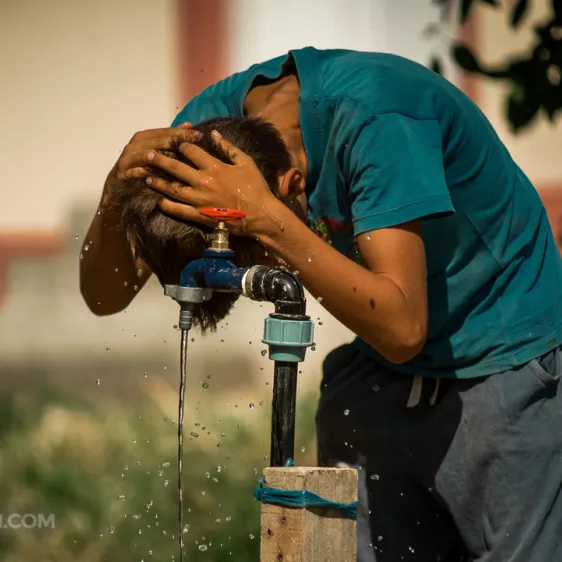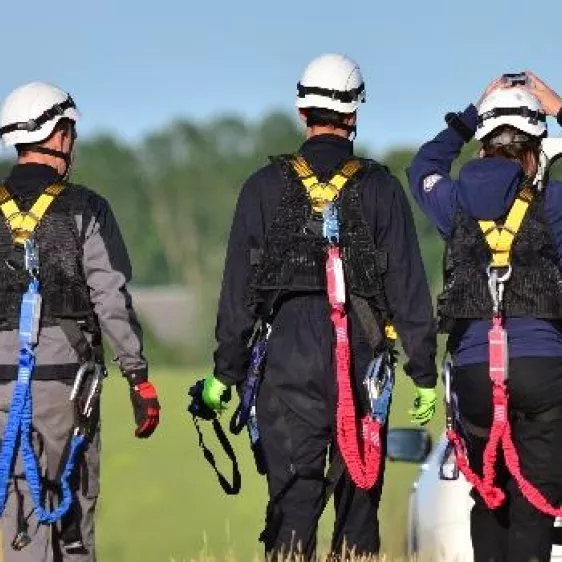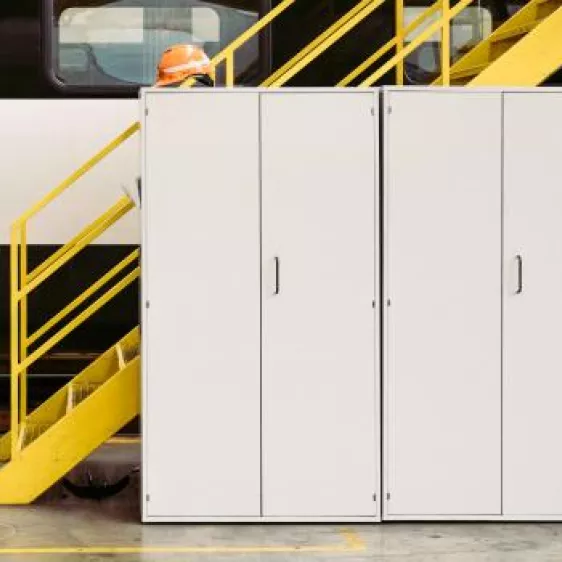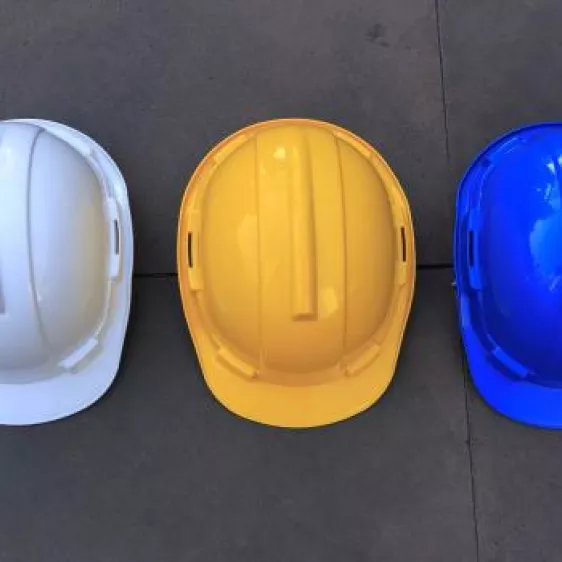We are well aware of the impact that our activity has in the local
communities where we develop our wind farms and how we can maximize
those potential benefits through an open communication with our
stakeholders.
Moreover as a responsible employer, we want to make EDPR the best place
to work.
In parallel, the prevention of occupational risks is a key priority of
the company. Employees, vendors and contractors must pay the maximum
interest and effort in order to achieve a healthy and safe workplace for
all those who provide services or live in the surrounding communities of
EDPR’s operations.
We believe it is important for us to contribute to the future viability
of society and create value in diverse ways.
Social Inititatives

EDPR is committed to forming a meaningful part of the communities where it operates. In addition to its role as an engine for economic development, the company is guided by three key social responsibility principles: contributing to EDPR’s integration with the communities that we work in, fostering initiatives to improve EDPR’s social responsibility standards and practices, and achieving sustainable growth while creating value for all stakeholders.
Whether it’s hosting fun and educational activities for local schoolchildren, contributing to the strength of local cultural associations, or leading environmental cleanup initiatives with a real impact on citizens’ quality of life, EDPR is putting these principles into action in communities around the world.
Generating the future: investing in education
Throughout the world, EDPR is involved in renewable energy education initiatives - hosting workshops for teachers and professionals, challenging university students to get involved and learn about renewable technologies, granting scholarships, being involved in local schools, offering resources to students in less privileged communities, and hosting events and fun activities for children at its wind farms.
EDP Brazil, for example, has supported education through its program “EDP in Schools.” The project aims to contribute to improve the quality of student’s life at public schools. Its main activities are delivery of school supplies, theater in schools, improving the school environment, cultural competitions, teacher training and environmental education campaigns. In Tramandaí, Água Doce and Horizonte, located in Rio Grande do Sul and Santa Catarina, the program began in 2009 and has reached more than 6,000 students in 11 rural schools.
The different projects of Generation EDPR exist because we believe there is no better way to contribute to society than to support the education and training of generations to come. University Challenge, Your Energy, Wind Experts and Green Education are proof of that.
Giving back: volunteering and financial support of local NGOs
EDPR also actively supports its communities by making financial contributions and volunteering at local organizations. Employees regularly volunteer at community organizations to help populations in need, in locations such as homeless centers, food banks, senior centers or child services organizations. In Spain, employees came together last year to put together humanitarian aid kits to help over 300 Syrian refugees.
Through EDPR’s “Computers for Charity” program, the company donates computers to different NGOs. In 2015, over 20,000 euros and 353 computers were donated to several NGOs, with Doctors without Borders receiving the most.
At EDPR NA, employees have organized book drives and “back-to-school” drives, through which they have donated needed materials and school supplies to Houston-area students. Every year, EDPR NA employees “Cycle for a Cause”, volunteering and raising thousands of dollars for Multiple Sclerosis. Employees also participate in races in many communities, for example, 100 women took part in the Roda Women’s Race to commemorate International Women’s Day.
Community involvement: hosting and participating in local events
EDPR makes it a priority to be involved in its communities by participating in and sponsoring different activities such as sports and cultural, environmental and educational events.
Many EDPR wind farms regularly host events for local students and the public to educate them about wind power. This is especially true on Global Wind Day, when many wind farms host fairs for communities and students with fun activities for children and educational components.
In addition to its educational initiatives, in many communities EDPR sponsors cultural events. EDPR recently sponsored a traditional music festival in a Polish community, as well as a photography walk to capture the beauty of the local landscape. EDPR also hosts many activities to help the environment - recently EDPR employees volunteered to help clean up a reservoir in Spain, and participated in a reforestation project in Romania.
The efficacy of the safety policy and the continuous improvement of the Group in the area of health and safety at work require the involvement of all levels of management, as well as the support and contribution of all employees, contractors and other stakeholders. According to its Code of Ethics, EDPR undertakes to give priority to employees’ safety, health and social welfare and to ensure the development of appropriate occupational health and safety management systems.
Occupational Health and Safety Policy
At EDPR, it is a top priority to guarantee the health, safety and well-being of employees and contractors. This commitment is supported by our Occupational Health and Safety Policy.

Health & Safety Management Systems
To achieve our zero accidents goal, EDPR has implemented health and safety management systems based on the OHSAS 18001:2007 specifications. The standards and procedures of these systems are adapted to the specific geography of the sites where they are used, and are developed based on each country’s regulations and industry best practices. EDPR takes a data-driven approach in order to identify and react to leading causes of injury. The implementation of these systems allows for better management and prevention of future accidents, with the objective of zero accidents overall.

Cálculo baseado na capacidade instalada de 2017.
# de acidentes com ausência/horas trabalhadas * 1.000.000
# of working days lost/hours worked * 1,000,000
The Principles of Sustainable Development of EDPR affirm the commitments to integrate the social aspects in planning and decision-making, to respect and promote respect for human rights and to reject abusive and discriminatory practices.
Thus, EDPR has in place a Code of Ethics for appropriate disclosure, transparency and impartiality. The Code is not an isolated feature – it belongs to an Ethics Management System that includes functional units, specific regulations, monitoring and accountability for our ethical performance, along with training, awareness-raising and capacity building for employees, service providers and suppliers.
According to its Code of Ethics, EDPR respects and undertakes to promote human rights along its value chain and particularly in the supply chain due to its significance to the business. This means that EDPR requires its suppliers and service providers to comply with their ethical standards. In this way, the acceptance of alignment with the spirit of EDPR’s Code of Ethics and the UN Global Compact principles is required. Furthermore, the Sustainable Procurement Policy references the promotion of respect for dignity and human rights, and the rejection of any form of forced labor or child labor, harassment, discrimination, abuse or other types of physical or psychological violence.
A Code of Ethics channel is available for the communication of any breach of the Code related to the matters of human rights, including those that may occur in the supply chain. The Ethics Ombudsman receives complaints of an ethical nature, investigates and documents the procedure for each of them. A preliminary report is then submitted to the Ethics Committee, whose main goal is to ensure compliance with the Code of Ethics within EDPR.
Additionally, EDP Group assumes the Universal Declaration of Human Rights and the conventions, treaties or international initiatives, such as the conventions of the International Labor Organization, the United Nations Global Compact and the guiding principles for business and human rights endorsed by the United Nations Human Rights Council – the Ruggie Framework.
EDPR's Ethics
EDPR is governed by a strong sense of ethics, whose principles are embodied in the day-to-day activities of its employees.
